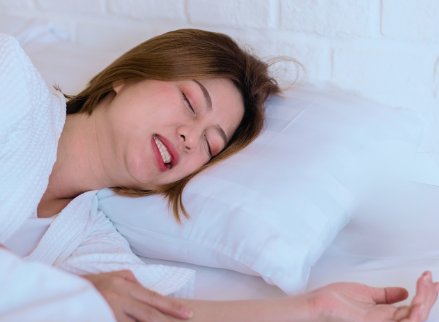What does grinding teeth in your sleep say about your health?
Published Apr 20, 2024 • By Somya Pokharna
Bruxism, commonly known as teeth grinding, is more than just a nocturnal nuisance. It's a common condition that can lead to significant health issues if left unaddressed.
So, what is it caused by? How to tell if you grind your teeth in your sleep and treat bruxism?
Chew on the information in this article to learn more!

What is Bruxism?
Bruxism is the medical term for the grinding of teeth or the clenching of jaws, actions often performed unconsciously. It can occur during the day (awake bruxism) or at night (sleep bruxism), with sleep bruxism being harder to self-diagnose due to its occurrence during sleep. It is more than just a nocturnal nuisance; it's a common condition that can lead to significant dental health issues if left unaddressed.
Bruxism affects people of all ages and lifestyles, from young children to the elderly, often without them even realizing it. While sleep bruxism is more commonly recognized in adults, awake bruxism tends to be observed across a broader age range, including children. Although it is difficult to pinpoint an exact number, research suggests that nighttime teeth grinding affects between 6% to almost 50% of children worldwide. This can start as early as when their first teeth appear, meaning even some babies and toddlers might grind their teeth. Conditions like sleep talking, sleepwalking, and bedwetting may make children more likely to have sleep bruxism. About 15% of teenagers experience sleep bruxism. The condition is less frequent in adults, with about 8% of those in middle age and only 3% of older adults grinding their teeth at night.
What makes you grind your teeth during sleep?
Various intrinsic risk factors and external causes contribute to the occurrence of bruxism.
Mental health issues
These are predominant triggers for bruxism, with many individuals subconsciously clenching their jaws or grinding their teeth as a reaction to anxiety, stress, depression, or frustration. This can occur both during waking hours and sleep, with increased psychological stress correlating strongly with these behaviors.
Genetic predisposition
There is a hereditary component to bruxism, as studies have shown that it can run in families. Approximately half of the individuals with sleep bruxism have a close family member who also exhibits the condition, suggesting genetic factors may play a role in its development.
Misaligned bite or irregular teeth growth
Structural abnormalities in the alignment of teeth or jaw can lead to bruxism. Children, in particular, may experience bruxism when their teeth are growing or if their bite is not properly aligned.
Behaviors and lifestyle
Habits such as smoking, heavy caffeine consumption, and alcohol intake have been linked to an increased risk of bruxism. These substances can alter sleep patterns or increase muscle activity in the jaw, contributing to more frequent episodes of teeth grinding.
Sleep disorders
Conditions like sleep apnea, characterized by temporary breathing interruptions during sleep, are often associated with bruxism. The disturbances in sleep caused by apnea may lead to more frequent arousals during which teeth grinding can occur.
SSRIs
Psychiatric medications, such as selective serotonin reuptake inhibitors (SSRIs) used to treat depression and anxiety, have been linked to bruxism. These drugs may increase serotonin levels in the brain, which could inadvertently stimulate the muscles involved in jaw movement.
Neurological conditions
Disorders such as Parkinson’s disease and Huntington’s disease can influence muscle control and movement, potentially leading to bruxism during sleep.
Other chronic conditions
Other health issues such as gastroesophageal reflux disorder (GERD), epilepsy, and certain types of dementia may also encourage the development of bruxism, particularly if they affect the nervous system or cause discomfort that leads to jaw clenching.
What are the signs and symptoms of bruxism?
Recognizing the symptoms of bruxism is vital for timely diagnosis and treatment to prevent long-term dental and muscular complications.
Dental symptoms
One of the most immediate and noticeable signs of bruxism is damage to the teeth. This includes flattened, fractured, chipped, or loose teeth. Over time, the force exerted by grinding can wear down tooth enamel, exposing the deeper layers of the tooth and increasing tooth sensitivity to temperature and pressure. This can lead to discomfort or pain, especially when eating or drinking hot, cold, or hard foods. Moreover, repeated grinding can create flat, smooth areas on the biting surfaces of the teeth, known as wear facets, which are clear indicators of bruxism. It can also lead to raised tissue or indentations on the inside of the cheek, where the teeth press against the cheek during grinding.
Jaw and muscular symptoms
Individuals with bruxism often experience soreness or tightness in the jaw muscles, particularly upon waking. This can evolve into chronic pain and fatigue of the jaw muscles throughout the day. In severe cases, bruxism can lead to temporomandibular joint (TMJ) issues, resulting in a locked jaw that won't open or close completely. People may also hear popping, clicking, or grinding noises when moving the jaw.
Pain and discomfort
Chronic teeth grinding and intense jaw clenching can cause dull, persistent headaches starting in the temples, as well as facial pain that mimics earaches, though the pain does not originate from the ear itself. This is due to the proximity of the temporomandibular joint to the ears, and it can even cause tinnitus (ringing in the ears). The intense activity of the muscles involved in bruxism may also lead to referred pain, which is felt in areas not directly affected by the bruxism, such as the neck and shoulders.
Sleep disruption
Sleep bruxism can disrupt the sleeper's rest and that of a partner who might hear the grinding noises. It is classified as a sleep disorder because of its frequent association with other sleep disturbances, such as snoring and sleep apnea.
How to stop grinding your teeth at night?
Bruxism can range from mild to severe, and treatments vary accordingly.
- Wearing mouthguards and splints, often custom-made by dentists, can protect the teeth from grinding and help position the jaw to reduce muscle strain.
- Techniques like meditation, yoga, and cognitive behavioral therapy (CBT) are beneficial in managing stress, a common trigger for bruxism.
- Reducing caffeine and alcohol intake and improving sleep hygiene can help alleviate symptoms.
- Being mindful of jaw clenching and practicing proper mouth and jaw positioning, which is teeth apart and tongue upward, can relieve jaw tension.
- Biofeedback can be useful for daytime bruxism, helping patients learn to control muscle activity through real-time feedback.
- Exercises to strengthen jaw muscles, along with applying cold or warm compresses, can provide symptom relief.
- In severe cases, muscle relaxants or Botox injections might be prescribed to reduce muscle activity. These treatments are generally considered when other methods have not been effective.
Key Takeaways
Bruxism, a condition marked by teeth grinding and jaw clenching, spans various ages and can significantly impact dental health if not addressed. It stems from numerous causes, including stress, genetic predisposition, and behaviors such as smoking and high caffeine intake. Recognizing symptoms early, such as jaw soreness, facial pain, tooth damage, and disrupted sleep, is crucial for effective management.
Treatment approaches vary from wearing protective mouthguards to proactively managing stress and adjusting substance intake. Regular dental check-ups can also mitigate the effects of bruxism, enhancing quality of life and preventing long-term dental complications.
Was this article helpful to you?
Give it a "Like" and share your thoughts and questions with the community in the comments below!
Take care!
Sources:
Bruxism — Johns Hopkins Medicine
Bruxism — National Institute of Dental and Craniofacial Research
Bruxism (teeth grinding) - Diagnosis and treatment — Mayo Clinic
Bruxism (teeth grinding) - Symptoms and causes — Mayo Clinic
Bruxism (teeth grinding): Causes and management – Medical News Today
Bruxism (Teeth Grinding): Symptoms, Causes & Treatment – Cleveland Clinic
Bruxism: A Literature Review — National Library of Medicine, NIH
Bruxism: Teeth Grinding at Night — SleepFoundation.org
How to Stop Grinding Teeth: Effective Prevention Strategies — SleepFoundation.org
Teeth grinding — Better Health Channel
Teeth grinding (bruxism) — NHS
Teeth Grinding: Causes, Treatments and Consequences — Cedars-Sinai
What is bruxism? — The Journal of the American Dental Association
Comments
You will also like

What are the dangers associated with the over-the-counter sale of certain medicines?
Dec 19, 2020 • 6 comments

 Facebook
Facebook Twitter
Twitter

